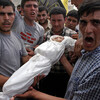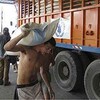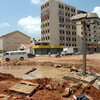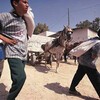
United Nations Relief and Works Agency for Palestine Refugees in the Near East, UN Office for the Coordination of Humanitarian Affairs, World Food Programme, World Health Organization, UN Food and Agriculture Organization, United Nations Children's Fund, United Nations Population Fund (UNFPA) and United Nations Development Fund for Women (UNIFEM)
3 August 2006
The United Nations humanitarian agencies working in the occupied Palestinian territory are deeply alarmed by the impact continuing violence is having on civilians and civilian infrastructure in Gaza, which has resulted in a sharp decline in the humanitarian situation facing 1.4 million people, more than half of them children. We are concerned that with international attention focusing on Lebanon, the tragedy in Gaza is being forgotten. We estimate that since 28 June, 175 Palestinians have been killed, including approximately 40 children and eight women, and over 620 injured in the Gaza Strip. Read more about UN Agencies: Deeply alarmed by continuing violence in Gaza

WFP has warned that it has suffered another setback in its huge efforts to bring much-needed aid to the beleaguered inhabitants of southern Lebanon. Out of three convoys planned for today to the southern villages of Tebnin, Rmeish and Naqoura, WFP only received concurrence from the Israeli Defence Forces to proceed to Tebnin. “We are increasingly frustrated that our convoy movements are being hampered, leaving people in the south stranded for what is now nearly three weeks. We have no time to waste - they are running out of food, water and medicine. Many are poor, sick, or elderly and could not be evacuated earlier,” warned Amer Daoudi, WFP Emergency Coordinator. Read more about Cancelled convoys hamper aid for stranded in southern Lebanon

With tens of thousands of people fleeing the escalating conflict in Lebanon, WFP has sent an emergency team to conduct a preliminary needs assessment of the logistics infrastructure and particularly the feasibility of reaching the population in the affected areas. The agency has already drafted contingency plans to draw on existing food stocks within the area as well as its emergency response depot in Brindisi, southern Italy. Tens of thousands of displaced persons, including women and children, have abandoned their homes and taken shelter in temporary accommodation in schools and social institutions. Cut-off from the rest of their families, they may require food aid to survive the crisis. Read more about World Food Programme sends emergency assessment team to Lebanon

The United Nations World Food Programme (WFP) said today that food was running out in the Gaza Strip and appealed to the Israeli authorities to allow food consignments to reach the tens of thousands of people in Gaza who depend on food aid to survive. At the same time, WFP called on the Palestinian Authority to take all necessary steps to ensure the security of WFP staff and other humanitarian aid workers inside the occupied Palestinian territory, to enable them to carry out their work unimpeded. WFP said the extended closures of the Karni commercial crossing between Israel and Gaza have had a devastating effect on food availability in the Palestinian enclave. Read more about UN warns food running out in blockaded Gaza Strip

The United Nations World Food Programme today announced it has stored food supplies in Gaza Strip to sustain tens of thousands of impoverished Palestinians ahead of the Israeli withdrawal which started early Monday. Anticipating possible logistic hurdles and uncertainty, the UN food aid agency in the occupied Palestinian territory pre-positioned 5,800 metric tonnes in 21 warehouses in the Gaza Strip. The food is sufficient to feed the 156,000 Palestinians who benefit from WFP rations until the end of October. In addition, WFP has already provided all beneficiaries in the densely populated Strip with a two-month ration for July and August. Read more about WFP stores food in Gaza for Palestinians affected by Israeli withdrawal

Many Gazans have traditionally depended on the sea for their livelihood. Of the estimated 1.3 million people living on the Strip, some 40,000 live off fishing. But Israeli restrictions on the movement of Palestinian fishermen over the past three years have left many destitute, including Sad. Since 2002, Gaza fishermen have been banned from going beyond six nautical miles from the shoreline. There have been long periods when that distance was cut in half and in southern areas of Gaza , like the cities of Rafah and Khan Younis, fishing has frequently been totally banned. Read more about Safety net for Palestinian fishermen

Amid continuing violence and conflict in the Palestinian Territories and the resulting deprivations on the lives and livelihoods of the population, the United Nations World Food Programme announced today that it will extend its emergency operation in the Territories for a further 12 months. Under the previous emergency operation, which ended last month, WFP provided food to more than half a million people in the Territories at a cost of US$29 million. For the past four years people’s lives have been affected by continuing political instability, military incursions, curfews, house demolitions and a “closure policy”, with over 600 checkpoints which prevent many Palestinians from reaching their work or schools. Read more about WFP extends emergency assistance to Palestinians

In an effort to address the dire socioeconomic conditions in the Palestinian Territories, the World Food Programme — in collaboration with the Palestinian Ministry of Agriculture — will purchase 416 MT of olive oil, at a value of US$1.3 million, from 2600 selected poor Palestinian farmers. The agency will then deliver the locally purchased olive oil to WFP beneficiaries living in Gaza and in the south of the West Bank who have limited access to oil due to its high cost and unavailability. Read more about WFP purchases olive oil to help ease hardship of Palestinian farmers
Christaine Berthiaume of the World Food Programme said that she had been in the occupied Palestinian territories last week. The situation in that region continued to deteriorate. A WFP study showed that more than 50 per cent of the inhabitants of the occupied territories lived below the poverty line. Read more about World Food Programme says situation continues to deteriorate in the occupied Palestinian territories

With increasing numbers of Palestinians becoming dependent on international food aid, the Executive Director of the United Nations World Food Programme, James T. Morris, on Wednesday began in Jerusalem a three-day visit to review first hand WFP�s efforts to provide food aid to Palestinians impoverished by deteriorating security and economic conditions over the past two years. Read more about Head of World Food Programme to visit occupied Palestinian territories








